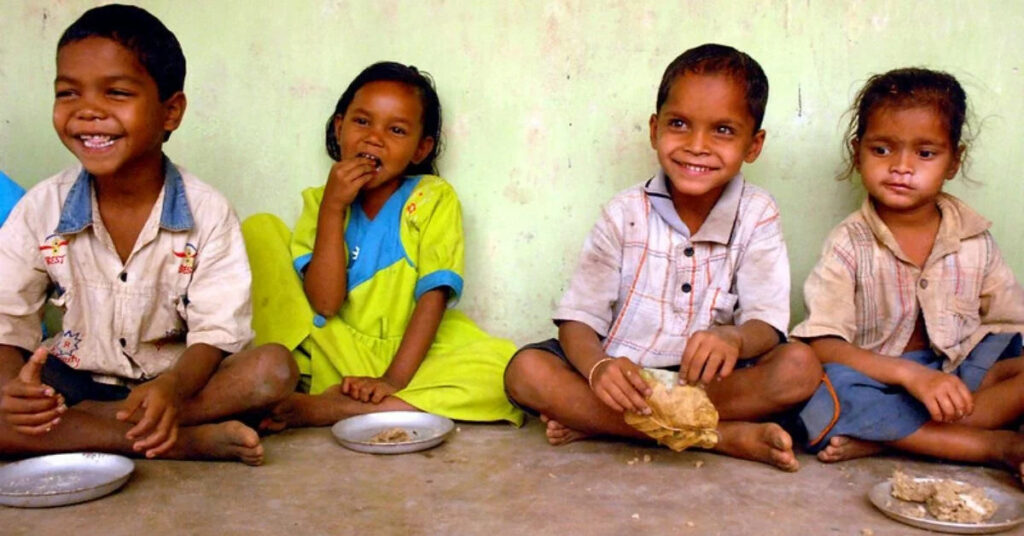
The Importance of Children’s Mental Health in Rural India
Summary on Mental Health in Rural IndiaMental health is crucial for children's overall well-being and development, especially regarding mental he....
Read MoreThe mid-day meal schemes in India, supported by organizations like CRY, plays a crucial role in improving child nutrition and promoting education. Its importance lies in reducing malnutrition, boosting school attendance, and lowering dropout rates. Among the key benefits of the midday meal scheme are better health, improved academic outcomes, and social inclusion. By ensuring one nutritious meal daily, the programme strengthens both learning and well-being, reflecting India’s commitment to addressing hunger and empowering children through education.

The primary purpose of the mid-day meal programme is to address classroom hunger while supporting education. By offering free and nutritious meals, it improves children’s health, encourages enrolment, and strengthens learning outcomes. The scheme also promotes equality, as children from all backgrounds share food, breaking caste and class barriers. This inclusivity fosters unity, while the initiative simultaneously combats poverty and malnutrition. These reasons explain why the mid-day meal is important for India’s education system and child welfare programmes.
Also Read: Educational schemes in india
The impact of the mid-day meal scheme has been remarkable nationwide. Government data shows over 120 million children benefit annually. Studies confirm declines in malnutrition, alongside improvements in weight, concentration, and learning outcomes. Girls, in particular, have recorded higher enrolment and lower dropout rates. Academic performance has also improved due to better classroom participation. These statistics highlight the benefits of the midday meal scheme, proving the programme’s value in improving both education and nutrition for millions of schoolchildren across India. Here are some key points based on available studies and reports:
The benefits of the mid-day meal programme extend far beyond food. Nutritious meals increase enrolment, reduce dropouts, and enhance focus in classrooms. Social equity is also promoted, as children from diverse communities share meals, helping dismantle caste barriers. Economically weaker families gain relief by knowing their children will receive at least one meal daily. Ultimately, the impact of the mid-day meal scheme lies in improving education, building healthier communities, and fostering inclusivity, making it a vital pillar of child development.
Also Read: Period Shaming
The importance of mid-day meals lies in its power to reduce malnutrition, improve attendance, and promote equality in schools. By serving millions of children daily, it enhances academic growth and social unity. This nationwide programme reflects India’s commitment to nutrition, learning, and building inclusive educational opportunities for every child.
By providing a nutritious meal to millions of children daily, the scheme helps combat hunger and malnutrition while simultaneously encouraging school attendance and academic performance. This comprehensive approach to child welfare has far-reaching implications for the overall development of the nation.
The mid-day meal programme has boosted school enrolment and reduced absenteeism significantly. Free meals act as an incentive for low-income families to send children to school consistently. By addressing hunger, the scheme ensures better retention, as children are motivated to attend regularly. This benefit of the mid-day meal programme highlights its role in strengthening the education system.
Proper nutrition supports cognitive growth, concentration, and memory. With the mid-day meal programme, children are more attentive in class, leading to stronger participation and better academic outcomes. Well-fed students perform better in exams and activities, benefiting overall learning. This clearly shows why the mid-day meal is important in ensuring healthy development alongside quality education.
The shared meals encourage unity among children from different backgrounds. By eating together, barriers of caste and class are reduced, creating more inclusive classrooms. This spirit of equality makes schools safer and friendlier spaces. The mid-day meal programme not only nourishes children but also strengthens social bonds, promoting fairness and dignity for every student.
Through balanced meals, schools expose children to varied, nutritious diets. This creates early awareness of healthy eating habits, hygiene, and food safety. The programme plants the foundation for lifelong practices that reduce malnutrition risks. By learning the importance of nutrition at a young age, children are empowered to make healthier choices in the future.
For underprivileged households, the mid-day meal scheme eases financial stress. Families know their children will receive one wholesome meal daily, reducing the cost of food. This allows parents to focus resources on other needs like healthcare and education. Thus, the programme supports both child welfare and broader community development by reducing poverty-linked challenges.
By improving nutrition, the mid-day meal programme enhances the overall health of children and their communities. Better diets reduce the risk of malnutrition-related illnesses and long-term medical expenses. With stronger immunity and growth, children can thrive both in and out of school. This community-wide improvement underlines the benefits of the midday meal scheme for society.
The core goal of the mid-day meal programme is to improve nutritional levels in children. By addressing stunting, wasting, and micronutrient deficiencies, the scheme promotes growth, physical strength, and immunity. With daily balanced meals, children achieve better health outcomes, ensuring they are equipped for learning, social interaction, and long-term well-being beyond the classroom.
ALSO READ: Importance of Nutrition For Children in India
Food safety and hygiene are critical to the scheme’s success. Meals must be cooked in clean environments, stored safely, and regularly inspected for quality. Parental and community involvement strengthens accountability. By ensuring high standards, the mid-day meal programme builds trust and maximizes benefits, keeping children safe, nourished, and motivated to attend school regularly.
Clean cooking areas, regular monitoring, and surprise inspections by authorities help ensure compliance with safety standards. Community involvement, including parents and local health officials, also helps enhance the quality and safety of the meals.
The mid-day meal programme in India stands as a symbol of the country's commitment to child welfare and education. Its multifaceted impact on nutrition, education, and social equity makes it essential to India's development strategy. As we look to the future, continued support and improvement of this scheme are crucial.
NGOs like CRY India play a vital role in supporting and enhancing such initiatives. Our goals often align with the objectives of the mid-day meal programme, focusing on child rights, education, and health.
We also ensure that the benefits of the mid-day meal programme reach every eligible child, contributing to a healthier, more educated, and equitable future for India's youth.
Despite its achievements, challenges remain in the mid-day meal programme. Ensuring food variety, safety, and consistent quality is crucial. Social issues like caste-based exclusion must be addressed so every child has equal access. Stronger monitoring and grievance redressal systems are needed to enhance accountability. Training cooks, upgrading infrastructure, and spreading nutrition awareness can further improve outcomes. Tackling these gaps will strengthen the programme’s impact, ensuring lasting benefits for India’s children and communities.
How does the Mid-Day Meal Scheme promote equality?
The mid-day meal scheme promotes equality by bringing children from diverse socio-economic backgrounds to share meals in schools. This practice breaks barriers of caste, religion, and economic status, encouraging inclusivity and mutual respect. The programme nurtures a sense of unity among students by promoting interaction and teamwork during mealtimes. The importance of a mid-day meal lies in its ability to develop an environment where every child feels valued, irrespective of their background.
How have mid-day meals helped increase literacy?
The mid-day meal programme in India plays a crucial role in improving school attendance, which is an essential factor in enhancing literacy rates. Providing free, nutritious meals incentivises parents to send their children to school regularly, which increases attendance, particularly in rural areas where food security is challenging. With better attendance, children receive consistent education, improving literacy levels. The effects of the mid-day meal programme also include enhanced focus and learning outcomes, as well-nourished children can better grasp lessons.
For children from underprivileged families, the mid-day meal scheme offers a compelling reason to attend school regularly. It reduces hunger, ensuring children have at least one nutritious meal a day, which many families cannot afford. This not only reduces absenteeism but also lightens the financial burden on parents. The importance of mid-day meals is evident in their role in improving enrolment and attendance, thus providing a pathway to education for disadvantaged children.